|
|
|
Sort Order |
|
|
|
Items / Page
|
|
|
|
|
|
|
| Srl | Item |
| 1 |
ID:
114812
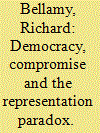

|
|
|
|
|
| Publication |
2012.
|
| Summary/Abstract |
Coalitions are often condemned as undemocratic and unprincipled because of the compromises they involve. Politicians are accused of betraying the commitments they made during the election. Paradoxically, proponents of this view suggest that if compromises are to be made they should be pragmatic and based on policy rather than principle. This article disputes this thesis and defends compromise as both principled and democratic. The first section distinguishes a shallow compromise based on the maximal satisfaction of exogenously defined preferences from a deep compromise resulting from reasoning on principle, and argues it proves impossible to avoid the latter. The second section suggests that the obligation to compromise forms part of the ethos of democracy, whereby citizens must agree despite their disagreements. The third section concludes by showing that while representatives will almost certainly betray their electoral mandate if obliged to make only shallow compromises, they can legitimately engage in deep compromises for their voters when they reason as they do.
|
|
|
|
|
|
|
|
|
|
|
|
|
|
|
|
| 2 |
ID:
114811
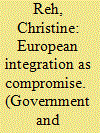

|
|
|
|
|
| Publication |
2012.
|
| Summary/Abstract |
The role of compromise in EU politics has been widely recognized by scholars and practitioners alike. At the same time, the systematic conceptual, analytical and normative study of compromise has remained an exception. This is surprising, given that the study of compromise can be linked to three broader questions at the heart of integration: (1) How does the EU accommodate diversity? (2) What makes supranational rule normatively justifiable? (3) Who or what defines the limits of cooperation? Against this backdrop, this article sheds light on the concept of compromise, on the role of compromise in legitimizing supranational governance and on the limits to compromise in the European polity. I argue that the EU - a divided, multilevel and functionally restricted polity - is highly dependent on the legitimizing force of 'inclusive compromise', which is characterized by the recognition of difference. This is true for horizontal or micro-level relations between political actors (where compromise works through concessions as well as justification, perspective-taking and empathic concern in a process of 'procedural accommodation'), and for vertical or macro-level relations between systems of governance (where compromise works through 'constitutional compatibility'). Given the legitimizing force of inclusive compromise, I subsequently identify the limits to such agreements and, thus, to supranational cooperation; I argue that these limits are issue specific and depend on where the costs of cooperation are borne. The article concludes by outlining routes for follow-up empirical research.
|
|
|
|
|
|
|
|
|
|
|
|
|
|
|
|
| 3 |
ID:
114809
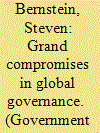

|
|
|
|
|
| Publication |
2012.
|
| Summary/Abstract |
Two attempts at grand compromise have underpinned global order since the end of the Second World War. The first, a compromise between laissez-faire liberalism and domestic interventionism, famously described by John Ruggie as 'embedded liberalism', legitimated and stabilized a multilateral order for 50 years. A second attempt, this time between North and South at the end of the Cold War around a discourse of 'sustainable development', remains uneasy, conflict prone and much less institutionalized. They are compared and contrasted by asking whether they are truly compromises or reflect domination and hegemony, what conditions led to them, and what drivers of change have limited and challenged them. Ultimately, differences in their bases of legitimacy offer lessons for the prospects of building a new grand compromise in the wake of contemporary strains on global governance.
|
|
|
|
|
|
|
|
|
|
|
|
|
|
|
|
| 4 |
ID:
114808
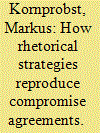

|
|
|
|
|
| Publication |
2012.
|
| Summary/Abstract |
How do actors, once they have reached agreement on a compromise, make this compromise persist? Being rooted in mutual concessions, it can never be taken for granted that compromises, once agreed upon, stay in place. Contestation about compliance is something that is very much to be expected and does not inevitably destabilize a compromise. Whether such a destabilization occurs or not depends on how actors communicate with one another. I contend that whether compromise persists or not has a great deal to do with the interplay of offensive and defensive rhetorical strategies that actors employ. I identify six offensive strategies (recourse, elaboration, entrapment, accusation, ostracism, abandonment) and six defensive ones (accommodation, placation, denial, deflection, inattentiveness, rejection), and chart the degrees to which offensive-defensive exchanges of strategies are conducive to reproducing compromises. Recourse-accommodation interplays on the one hand (most conducive) and abandonment-rejection interplays on the other (least conducive) form the poles of the spectrum of exchanges. I probe my theoretical framework by inquiring into the stability of the grand compromise that underpins the nuclear non-proliferation regime. The findings support my framework. The parties have tended to stay away from heavy rhetorical artillery and stuck to less robust rhetorical strategies. Elaboration and placation strategies have played a particularly important role for making the grand compromise persist.
|
|
|
|
|
|
|
|
|
|
|
|
|
|
|
|
| 5 |
ID:
114810


|
|
|
|
|
| Publication |
2012.
|
| Summary/Abstract |
The international community has many reasons to promote compromise between the parties to internal conflicts. Yet to do so effectively, the international community ought to treat principled rather than strategic compromise as its default position. To make this case, we begin by defining 'compromise' and by distinguishing principled from strategic compromise. We then defend the idea of principled compromise against the realist who thinks that that idea is implausible. We conclude by offering a number of practical reasons why principled compromise ought to be preferred. Our argument does not deny that strategic compromise will sometimes be the only option. But, unlike principled compromise, strategic compromise does not provide the parties with any particular reason to look beyond their own particular concerns or to give any ground beyond what is absolutely necessary.
|
|
|
|
|
|
|
|
|
|
|
|
|
|
|
|
| 6 |
ID:
114805


|
|
|
|
|
| Publication |
2012.
|
| Summary/Abstract |
Compromise is routinely evoked in everyday language and in scholarly debates across the social sciences. Yet, it has been subjected to relatively little systematic study. The introduction to this inter-disciplinary volume addresses the research gap in three steps. First, we offer three reasons for the study of compromise: its empirical omnipresence in politics, its theoretical potential to bridge the rationalist-constructivist divide, and its normative promise to recognize the plurality of society. Second, we introduce different approaches to the coherence, legitimacy and limits of compromise found in the existing explanatory and normative literatures. We discuss why these literatures need to speak to one another, and identify possible applications in empirical research. Third, we conceptualize compromise as one possible solution to a conflict. Distinct from both dissensus and consensus, all compromises share three characteristics: concessions, non-coercion and continued controversy. However, different types of compromise can be distinguished by how mutual, costly and painful concessions are; by whether all forms of coercion are absent; and by the degree to which the relevant parties' grounds for conflict are transformed. We conclude by discussing the challenge and appeal of 'politics as compromise' in plural and complex societies.
|
|
|
|
|
|
|
|
|
|
|
|
|
|
|
|
| 7 |
ID:
114806


|
|
|
|
|
| Publication |
2012.
|
| Summary/Abstract |
This article provides a social psychological analysis of the neglected issue of 'intergroup compromise'. We discuss the factors that promote respondents' willingness to compromise with two very different outgroups. We present a framework in which altruistic motivations (such as empathy) and egoistic motivations (such as trust and symbolic threat) act as proximal predictors of compromise, with intergroup contact as a distal predictor. We found that respondents who had more positive contact with homosexuals perceived them to be less threatening, and felt more empathy towards them, and in turn, were more likely to compromise with them on group-specific issues (controlling for the general tendency to compromise). We also found that respondents who had more negative contact with Muslims perceived them to be more threatening, and in turn, were less likely to compromise with them. We discuss these results with reference to recent developments in intergroup relations and the state of public discourse in contemporary Britain, examine their implications for intergroup relations in pluralistic contexts, and make suggestions for future research on willingness to compromise with outgroups.
|
|
|
|
|
|
|
|
|
|
|
|
|
|
|
|
| 8 |
ID:
114807


|
|
|
|
|
| Publication |
2012.
|
| Summary/Abstract |
Many of the violent conflicts of the post-Cold War period have involved peoples who have historically been victims of interstate politics. Compromise is highly problematic in contexts of this kind, given that sovereign powers tend to attach the label 'terrorism' to acts of resistance and the resistance tends to claim an experience of injustice. Given a situation where compromise is seen by actors on both sides to be impossible, how would anything other than a 'rotten compromise' be possible? The article develops a framework called the Warden's Dilemma which is then put to use in the empirical exploration of two historical cases: the hunger strikes in Northern Ireland in 1980-81 and the martyrdom of Polish Solidarity's priest, Jerzy Popieluszko, a few years later.
|
|
|
|
|
|
|
|
|
|
|
|
|
|
|
|
| 9 |
ID:
114813
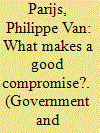

|
|
|
|
|
| Publication |
2012.
|
| Summary/Abstract |
A compromise is an agreement that involves mutual concessions. Each party gets less than it feels entitled to, but agrees to it because the situation it anticipates under the deal is better than the one it expects in the absence of a deal: conflict, exit or arbitration by a third party. Some compromises, however, are bad, and others are good. This article discusses three conjectures about what it is that makes a compromise good. Is a good compromise an honourable compromise, one that enables each party to save face? Is it rather a fair compromise, one that contributes to the progress of justice independently defined? Or is it a Pareto-improving compromise, one that changes things in such a way that it ends up making everyone better off than under the status quo? A compromise is never as good as a consensus, but it is generally better than nothing, and often achievable when a consensus is not. And when it is, trying to make it as good as possible in each of the three ways described is always worthwhile.
|
|
|
|
|
|
|
|
|
|
|
|
|
|
|
|
|
|
|
|
|